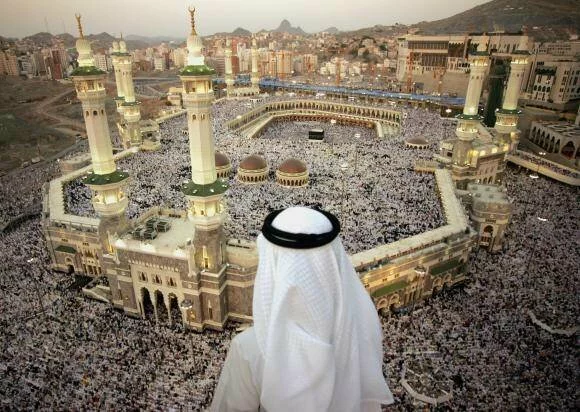Islam lays great emphasis on unity in the Muslim Ummah. The Holy Quran strongly emphasizes the concept of Muslim Unity and Allah urges the Muslims to “… hold fast, all of you together, to the Rope of Allah, and be not divided”. This verse clearly outlines that contributing towards establishing unity between the Muslim Ummah is not just a credit worthy deed for a Muslim but also an instruction exclusively given by Allah to the believers. The believers must, therefore, undertake to work for achieving a unity between Muslims and for the formation of a larger Muslim brotherhood.
All worships and pillars of Islam, in one way or the other, help in the establishment of this unity between Muslims. Let’s begin by taking the example of prayer. Praying 5 times a day, i.e. at Fajr, Zuhr, Asar, Maghrib and Isha times, is obligatory for Muslims. Muslims from all places within a locality pray to the Lord at same time, and bow their heads in the same direction. This is a symbol of unity between Muslims while prayer. Further, praying in congregation is said to be preferable than playing alone, because the former establishes unity and equality among Muslims.
Now let’s take another example to substantiate our point. Zakat is another pillar of Islam, and it is given out to poor Muslims, as a percentage of the wealth or rich Muslims. Zakat, therefore, is meant to create a level economic ground for Muslims, which brings them together on all footings and unites them. Hajj, another pillar of Islam and a very important worship for Muslims, also propagates the same idea of Muslim unity by congregating Muslims from all over the world, and allowing them a platform where they can collectively discuss their problems and seek their solutions.
Just as all these worships, Ramadan and fasting in Ramadan also come as a great source of unity for Muslims. Ramadan is commenced and concluded by moon sighting (or calculation methods) and the month begins and ends at the same time throughout the Muslim country. This commencement and conclusion of Ramadan at the same time bonds the Muslims all over the nation together. Similar practices are observed and similar routines are followed by Muslims all over the country. By freeing themselves of material desires in Ramadan, Muslims afford themselves an opportunity to reflect upon the larger picture of the Muslim nation.
Hunger and thirst that a fasting Muslim endures brings him closer to the pain bore by the poor Muslims whole year. Mosques begin to fill by Muslims, and more and more meetings are held as religious sermons or Aftaar parties. This allows Muslims to meet each other and bond together strongly. In these meetings, religious discussions remind Muslims of their social and religious duties, and refresh their faith. Most Muslims pay their Zakat during Ramadan, which bonds the society together further strongly by bridging the gap between the poor and the rich.
If one considers all the rituals and practices followed in Ramadan, he will find that the impact of the month of Ramadan on Muslim unity and faith is enormous.




